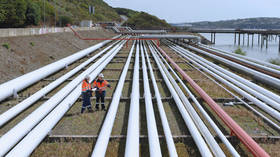‘Millions’ of Germans won’t be able to pay for heating – union

At least a third of Germans on low incomes may not be able to pay increasingly high energy bills, the German Tenants’ Association (DMB) has warned, urging the government to make changes to housing programs.
“That’s a hell of a lot of people,” Lukas Siebenkotten, the DMB’s chief, told newspaper Der Tagesspiegel on Sunday. “We’re talking about millions here.”
Siebenkotten urged the government to allow more people to claim housing benefits in the wake of rising energy prices. “Tenants must also be protected from the termination of contracts if they cannot make increased advance payments,” he said.
The remarks came after Klaus Mueller, the head of the Federal Network Agency, Germany’s gas regulator, warned that consumers should conserve at least 20% of gas in order to avoid shortages during the winter.
“In all other scenarios, we either face the threat of a gas shortage as early as December, or have low-level shortages at the end of the upcoming heating season,” Mueller said, describing current gas prices as “astronomically high.”
High inflation and increased energy costs in Germany have been exacerbated by fears that Russia might completely cut off supplies of natural gas to the country. Germany and other EU states imposed sweeping sanctions on Moscow in response to its military campaign in Ukraine and unveiled a plan to phase out Russian gas.
However, the German government has repeatedly warned that an immediate end of supplies from Moscow would badly damage the economy, increase unemployment and lower living standards.
Russian gas company Gazprom decreased the flow to Germany through the Nord Stream 1 Baltic Sea pipeline and then suspended deliveries altogether for 10 days last month for maintenance work.
According to Gazprom, the routine maintenance process had been disrupted by the hold-up of a repaired turbine in Canada, which Ottawa initially refused to return to Germany due to sanctions.
Berlin rolled out a gas-saving plan late last month, which includes boosting reserves in gas storage facilities and using more coal power plants.













